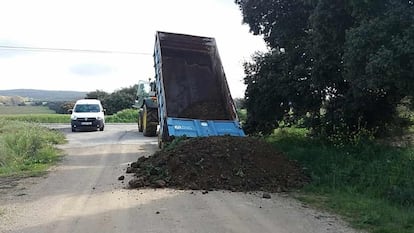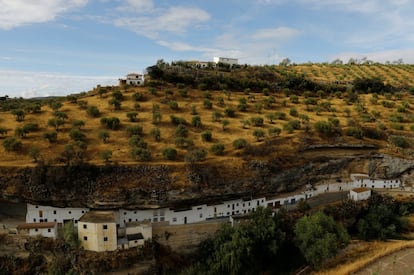The Spanish villages raising barriers against the coronavirus
Local authorities in some popular tourist destinations are blocking off access roads with piles of earth and concrete blocks

A few Spanish towns are taking unilateral measures to protect themselves from the coronavirus – and from the arrival of outsiders who might be infected.
In one case, the locals closed off three roads leading into town with large mounds of earth, a move that lets them easily control who goes in and out with help from the local police. In another, concrete blocks were used for similar purposes.
The central government has warned local officials that they lack the authority to adopt these kinds of measures
These initiatives are taking place in municipalities run by different political parties, often in places that normally thrive on tourism. The central government has already warned local officials that they lack the authority to adopt these kinds of measures.
Police checks are now a common sight on Spain’s roads, particularly at entry points of large cities, as authorities try to prevent people from circumventing the stay-at-home orders issued by the government on March 14. Since the lockdown was enforced, the police have made dozens of arrests and filed thousands of complaints against violators, many of whom were attempting to travel to their second residences.
But during the five days that elapsed between school closures in Madrid and the declaration of a state of alarm, municipalities along the coast of Valencia, Alicante, Murcia, Andalusia and Galicia reported large amounts of visitors from what was already the epicenter of the coronavirus crisis. This drew an angry response from some residents of these coastal areas.
Andalusia

In Setenil de las Bodegas (Cádiz), a village of 2,700 residents that is pretty as a picture and normally welcomes scores of day-trippers, barriers made of earth now block all but the main road into town. The decision was made by Mayor Rafael Vargas, an independent whose government claims that the barriers make work easier for the local police, which conducts checks on passing cars. Local authorities have also asked residents for cooperation in reporting “odd traffic movements.”
Setenil is not the only municipality to take such action in Cádiz, a province in southern Spain that receives a lot of tourism because of its famous white villages and where many Spaniards also have holiday homes.
Zahara de la Sierra, which is governed by the Socialist Party (PSOE), has been boasting for days of being coronavirus-free and of having turned itself into something like the indomitable village in Gaul featured in the Astérix comic books. Local authorities have closed off all but one of the roads into town with chains and fences. Police officers stop every vehicle, which has to go through a disinfection gate and whose drivers need authorization to proceed into town.
We all know each other; we know who goes in and who goes outSotero Martín, mayor of Cazalla de la Sierra
In the larger Vejer de la Frontera (12,700 residents), which is well known for its beach of El Palmar, the local government keeps coming up with new ways to keep visitors out. The Popular Party (PP) administration has closed all but one access road into town and said it will keep a close eye on properties used as holiday rentals.
And in Salobreña, in Granada province, Mayor María Eugenia Rufino of the PSOE closed the beach three weeks ago in a bid to stop the flow of people going there on holiday just as the coronavirus epidemic was beginning to gain traction. These days, all roads into town except for one have been closed and the Civil Guard conducts checks on everyone passing through. “I thought people would not take it well, but it’s been rather the opposite, everyone agrees with it,” said Rufino.
“We all know each other; we know who goes in and who goes out, which homes are occupied and which are sitting empty,” adds Sotero Martín, the mayor of Cazalla de la Sierra. “The residents alert local officials. The local police and Civil Guard have also drawn up a list of uninhabited homes that they keep tabs on. And on vehicles as well. We know from the license plates which ones are from here and which are not.”
Valencia region
In Navajas, a small town in Castellón province, the local authorities told everyone who was not a local resident to go back home following the central government’s confinement orders. News of this reached the government delegation in the region, which warned municipalities that they were not “free to re-interpret” the government’s royal decree.
Northern Spain has also seen a few of these isolationist practices. In Noja, a small village of 1,500 residents in Cantabria, concrete blocks have been preventing vehicles from using three of the four roads into town since March 27. The Civil Guard has already warned the mayor, Miguel Ángel Ruiz, that he must desist, but Ruiz said he “was backed by the local residents,” according to sources in the government’s delegation in the area. Ruiz himself denies this. In the meantime, representatives of the Ciudadanos party in the popular tourist destination of Suances have already asked for similar action as Noja.
English version by Susana Urra.
Tu suscripción se está usando en otro dispositivo
¿Quieres añadir otro usuario a tu suscripción?
Si continúas leyendo en este dispositivo, no se podrá leer en el otro.
FlechaTu suscripción se está usando en otro dispositivo y solo puedes acceder a EL PAÍS desde un dispositivo a la vez.
Si quieres compartir tu cuenta, cambia tu suscripción a la modalidad Premium, así podrás añadir otro usuario. Cada uno accederá con su propia cuenta de email, lo que os permitirá personalizar vuestra experiencia en EL PAÍS.
¿Tienes una suscripción de empresa? Accede aquí para contratar más cuentas.
En el caso de no saber quién está usando tu cuenta, te recomendamos cambiar tu contraseña aquí.
Si decides continuar compartiendo tu cuenta, este mensaje se mostrará en tu dispositivo y en el de la otra persona que está usando tu cuenta de forma indefinida, afectando a tu experiencia de lectura. Puedes consultar aquí los términos y condiciones de la suscripción digital.








































